[Update: I just got word from Russ that Take This has received a check from FirstGiving for the funds raised on Indiegogo. This will help Take This and the AFK Room Program survive 2017. They have still not received an official response from Indiegogo.]
In 2013, veteran journalists Russ Pitts and Susan Arendt teamed up with clinical psychologist, Dr. Mark Kline, Psy.D to create Take This, Inc. Take This is a 501 (c) (3) non-profit charity that provides education and support about mental health issues to the gaming community. In order to fund their programs for 2017, Take This, launched an Indiegogo campaign. Unfortunately, halfway through their funding period Indiegogo cut them off without warning.
If you’ve been to any major gaming convention recently you’ve probably seen Take This at work. The organization provides gaming cons and expos with the AFK Room, a quiet space staffed with volunteers and clinicians. These much needed safe havens help people regain their calm and know they aren’t alone in times of stress.
“We didn’t realize the AFK Room would literally save lives when we started it, but it has,” Take This, Inc. President, Russ Pitts said, “And that’s not hyperbole. I’ve seen people come in with desire and plans to end their own lives because of the stresses they are dealing with. Watching how our volunteers can help calm people in such dire need and get them to the emergency services they require is… powerful.”
Previously Take This was supported by a grant which earmarked all funds towards developing the AFK Room Program. This was their primary funding source over the past three years. The sudden and unexpected loss of this grant was what lead the organization to crowdfunding in the first place. The team registered all of their charity bonafides through the non-profit, peer-to-peer fundraising platform, FirstGiving. At the time, FirstGiving handled Indiegogo’s non-profit payments. Given this and Kickstarter’s reputation for being less amenable towards charitable fundraisers, Take This decided to seek funding through Indiegogo.
Take This launched their campaign, seeking a flexible funding goal of $200,000. The money would go towards establishing an AFK Room at the 7 major yearly conventions Take This has become part of, while working toward funding five additional cons in the coming year.
More Than A Room
“The entire process of creating a new AFK Room isn’t as simple as flying into town and setting up chairs. It takes anywhere from 4-18 months. And costs tens of thousands of dollars,” Pitts said. “In order to do it right, we spend months recruiting local organizers in the cities where we operate, and then training recruits in how to help people in the AFK Rooms. Even licensed and experienced clinical health care workers require this training. And many people we recruit have never worked with a gamer, or had experience at a convention.”
“When we start an AFK Room at a new convention, we’re essentially creating a clinic of sorts in that local area. And we have to recruit people familiar with the local laws and licensure. And in order to fulfill our obligation to train up the convention staff in how to interface with attendees about mental health issues, we need to be familiar with that specific convention’s organization, audience, and protocols.” All things which require proper funding.
Unexpected Complications
Unfortunately, and unbeknownst to Take This, Indiegogo had been making changes to their payment options. In addition to adding more currencies through their credit card processor, Stripe, they were also removing FirstGiving as a payment option for non-profits. All draft or inactive campaigns would have this option removed on February 21st and February 28th for active campaigns. Valuable information that was not shared with Take This.
“I found out when I checked the campaign page the Wednesday of GDC, just to see how well it was doing as I was killing time waiting for my talk to game developers about mental health in the workplace to begin,” Pitts said, “I was about three hours away form taking the stage. My heart (figuratively) exploded, and I called all hands on deck to see how we could work the problem.”
Of course the team immediately reached out to Indiegogo for some explanation as to why their campaign was suddenly closed halfway into their funding period. Indiegogo has been less than helpful in regards to providing answers.
“As of the date of this email, I have not yet had any direct answer to my queries from Indiegogo. This, in spite of they’re telling us our issue has been “escalated”,” Pitts said. So far the only explanation they’ve received didn’t come to them from Indiegogo. Rather one of their backers shared an email they’d received from the platform mentioning their transition away from FirstGiving.
“I have no human contact with the company, and the only email we received from them in answer to our questions as to why they closed the campaign was automated, and dated weeks prior to when it was sent. They have absolutely let us down, and the worst part is they won’t even acknowledge it, and haven’t offered to explain why.”
The campaign closure came at a particularity difficult time as the team was preparing for PAX East. They knew it was important to have the campaign available during the show because it provided them the best opportunity to demonstrate the program while attempting to raise money. The team quickly began pulling assets from the Indiegogo campaign in preparation for a move to Kickstarter.
Making It Work
It was risky, as Kickstarter doesn’t always approve charitable fundraisers. Luckily, the risk paid off. “We had it approved and ready to go the Monday of PAX East (about four days all told).”
Thus far the campaign received strong support from the Kickstarter community. Pitts commented that re-starting on a new platform allowed him to correct some mistakes made on the initial page. Overall, he felt the Kickstarter campaign had a stronger presentation. They were easily able to surpass their reduced $10,000 funding goal in less than a week. Even so, their budget problems aren’t resolved.
“We are not quite yet to a point with our fundraising where I can say our AFK Room program will continue in 2017 as it has in previous years. We still have a few shows un-funded. And considering that’s our biggest expense by far, it’s hard to determine how well we will be able to continue any of our operations until those rooms get funded.”
“There exists a chance that, if we don’t meet a minimum fundraising goal, we will cease operations entirely in 2017. We have a few options for avoiding that, but it’s still a possibility.”
Despite the mixed blessing of a successful Kickstarter, the situation with Indiegogo has remained frustrating and stressful for Pitts and his team. Take This had hoped Indiegogo would be a strong partner in their efforts to keep the program funded. “But so far they have been a nightmare,” Pitts said.
Indiegogo has yet to confirm if or when Take This will receive the $28,265 raised during the truncated campaign. It’s a slap in the face to not only the organization, but also the 104 Indiegogo backers who trusted the platform. Regardless, Take This and their AFK Room program continue to soldier on for community members in need.
Fighting Stigma, Together
“We have been told “If you weren’t here something bad would have happened.” Thinking about that, and how we might have to abandon some of the shows we’ve supported is difficult for us. All of us hope this fundraising campaign helps us avoid that,” Pitts said.
You can visit the Take This Kickstarter campaign to learn more and donate to the program. You can also spread the word to help keep the door to the AFK Room open.

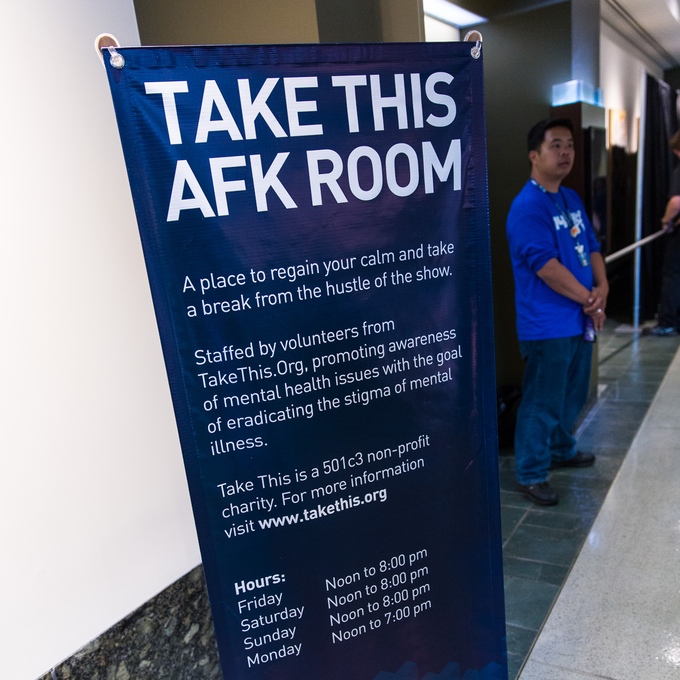
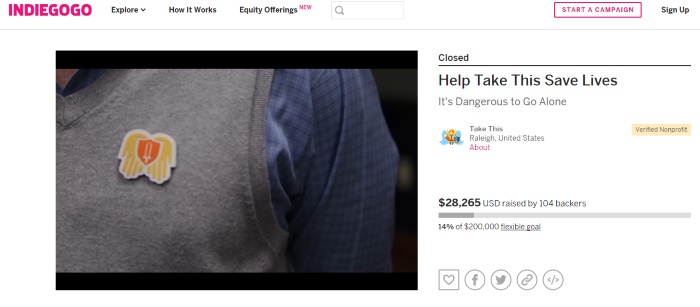

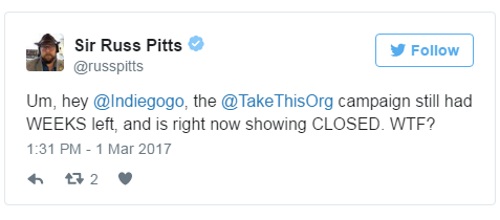
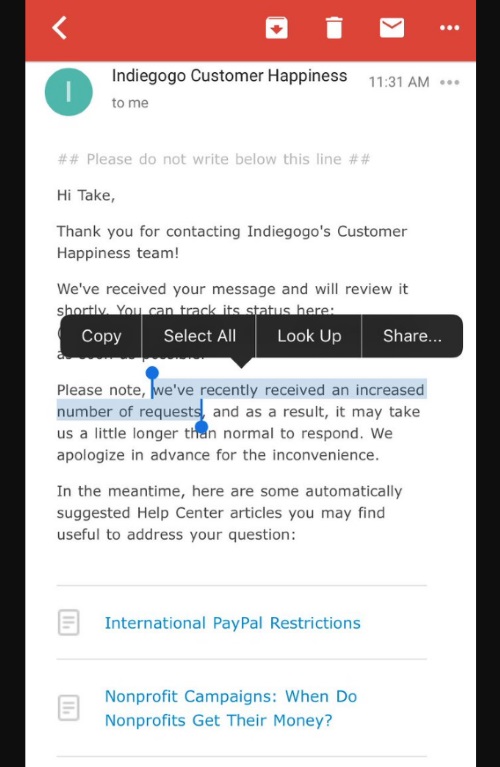
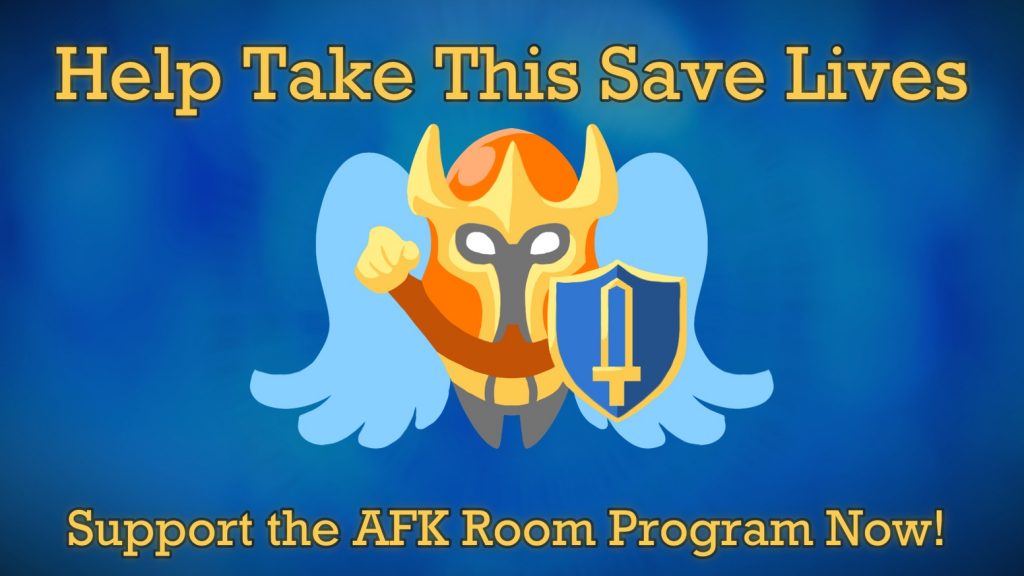
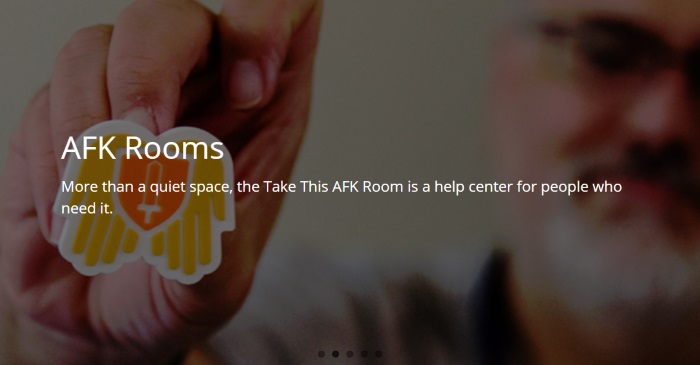



[…] noticed that we changed platforms from Indiegogo to Kickstarter partway through the process. Cliquist recently sat down with Take This co-founder Russ Pitts to discuss the reasons for that change, the […]